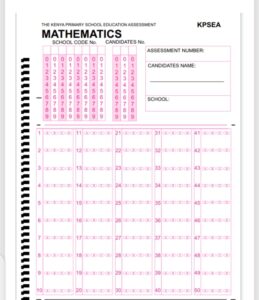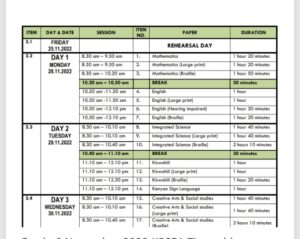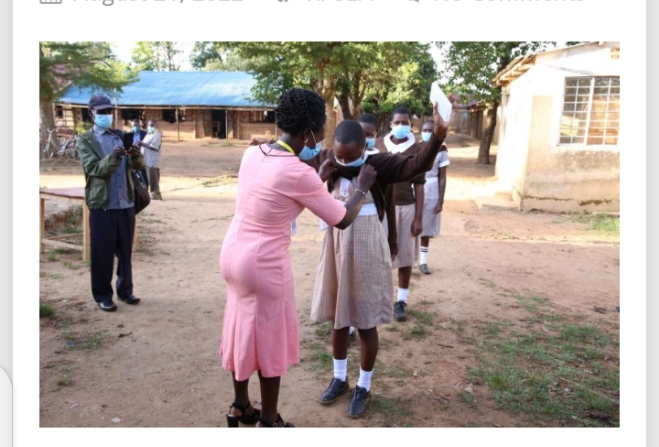The Competency Based Assessments (CBA) will save government millions of shillings in examinations printing, administration and management.
Unlike the outdated Kenya Certificate of Primary Education (KCPE) where teachers are contracted to mark English Composition and Kiswahili Insha papers, in this new system there are no such papers.
The Kenya National Examinations Council (Knec) has already released samples of the upcoming grade six national exams which shows that Composition and Insha will not be tested.
This means teachers will not be involved in the marking of the final national exams in primary school as it used to be with KCPE.
Infact Knec has advertised for training of KCPE and KCSE examiners next month but has not advertised the same for marking of any Kenya Primary School Education Assessment (KPSEA) exams.
The training of KCPE and KCSE examiners will take place between 18th and 24th September 2022 at a cost of sh 10,500 each.
The Competency Based Assessments (CBA) will help the examiner to cut down cost of examination management.
Since the KPSEA exams will be purely in multiple choices the marking will easily be done using the new technology.
In the last KCPE exams, the marking of multiple-choice questions were made easier by the acquisition of the modern Optical Mark Recognition (OMR) which electronically scored the papers.
The OMR captured marked data from candidates’ answer sheets using specialized scanning.
The machines worked with a dedicated scanning device that shined a beam of light on the paper.
The contrasting reflection at predetermined positions on a page was used to detect marked areas as they reflected less light than the blank areas of the paper.
With the new machines, scripts were marked in batches of 100 and 200 sheets, unlike the previous technology, which took hours.
Grade 6 learners sat for their School Based Assessments (SBA) in Grade 4 and 5 and will do their last one in Grade 6.
Grade 6 learners are carrying out their Knec national practical assessments this month.
In Art and Craft the practicals are about Making a marrionete, in Home Science its about Stewing, in Music its about Solo performance (Folk song), in Science and Technology its about Modelling a human circulatory system and a computer practical on microsoft excel data entry, in Physical and Health Education its about Handball, Rope skipping and Swimming.
The Grade 6 learners will sit for their written tests starting early next month. Knec said they will start from 29th August to 9th September 2022.
In these assessments Knec only provides online copies which schools download and printed for their learners.
*KPSEA Mathematics answer sheet (sample) *

Teachers also help with marking, scoring, recording and feeding the final marks on an online portal. Throughout the assessments Knec is able to evade direct costs that come with such exams.
The Grade 6 learners will sit for their final test in primary schools in November this year.
The test known as Kenya Primary School Education Assessment (KPSEA) will start from 28th to 30th November 2022.
The exams have been printed and are ready for administration this year, according to Education CS George Magoha.
Knec has released a timetable for the exams which shows the exams will take three days.
The Grade 6 learners will also have a day for rehearsal which will be on 25th November 2022 just like it used to be with KCPE exams.
The KPSEA exams will be marked by December before the Grade 6 learners proceed to junior secondary in January 2023.
The KPSEA national test will replace the outdated Kenya Certificate of Primary Education which has been in place for decades.
The Grade 6 regular learners will sit for five subjects in their final assessment in primary school.
These are; Mathematics, English, Kiswahili, Integrated Science and Creative Art and Social Studies.
*Grade 6 November 2022 KPSEA Timetable *

Knec Competency Based Assessment (CBA) Coordinator Ann Ngatia explained that Integrated and Creative Sciences will be an integration of various subjects and that the five will be part of the KPSEA at the end of primary school.
“The exam will be a multiple-choice test covering the five papers. IS will see us combine science and technology and will cover Home Science, Agriculture, and Physical Health while CASS will combine Art and Craft, Music, Social Studies and religious education (CRE, IRE and HRE),” she noted.
The coordinator added that the primary school results will be determined by the School Based Assessment (SBA), which is done every year in the upper primary classes and the five-subject summative national examination.
“We will have a 60 per cent of the score coming from SBA spread over Grade Four, Five and Six and 40 per cent from the summative report so that we do not rely on a one-time assessment to determine the potential of the learner,” Ngatia added.
Ngatia expounded that the school-based evaluation will be done in form of projects, practicals, portfolios and oral assessments to allow learners to demonstrate what they have learnt, this will be executed by the classroom teachers guided by Knec.
On his part, Deputy Director for Secondary Education Lawrence Karundi noted that the Junior Secondary Schools will be domiciled in high schools.
He also revealed that the Grade Seven to Eight students will be day scholars.
“When it comes to the issue of dormitories, especially with the junior secondary, our focus is that this should be a day school, not boarding. The transition will be in such a way that students join schools within where they are now, therefore, boarding may not be necessary,” Karundi stated.
Deputy Director in the State Department for the Implementation of Curriculum Reforms, Ruth Mugambi added that the Grade Six candidates will be placed into Junior Secondary Schools based on their performance, subjects chosen and the ability to join the day schools.
“Placement will be determined by the performance of the learners in Grade Six report and the optional subjects that they will have chosen. The students will be informed which schools offer the subjects within their proximity based on guidelines from the ministry,” Mugambi added.
Knec will also carry out a piloting of KPSEA national exams in September in selected schools.
According to the pilot assessment schedule released by Knec the study will start on 28th and end on 30th September 2022.

